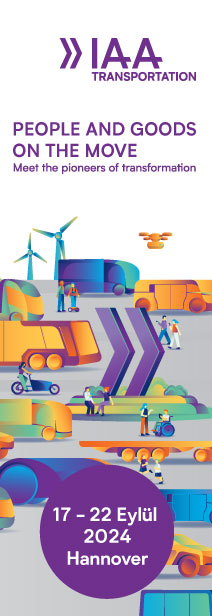As you look back, how do you reflect on your first 12 months?
“It has been a fascinating year since taking over at Volta Trucks. An enormous amount has been achieved. I am very proud of a team of people who have come together through an incredibly challenging year to deliver outstanding success early in our journey. We have raised capital; we have scaled the team and we have built a corporate culture we all want to work for. We have also generated a major order book, all within the challenging context of COVID 19, with very little face-to-face interaction. It was an unusual time to take over as CEO of a start-up and leave the safety of a large corporation shortly before (hopefully) the worst pandemic we will ever see. It was an interesting piece of timing – not one that anybody could foresee – but which has also made our achievements even more significant.”
You joined as CEO a year ago. What initially attracted you to the role?
“The vision of the Founder and Co-founder was inspiring, to see a much better sustainable transport solution inside urban environments. As a fleet operator at DPD Group, I saw the lack of supply of electric commercial vehicles into the market hindering the sustainability plans of several companies. This apparent lack of willingness for OEMs to change presented an opportunity for me to have a real influence on electric vehicle supply. And having three young children, I’m very committed to a sustainability agenda and leaving the planet better for them than we inherited, so it is a great opportunity to influence that.”
How has the company developed over the past year, what have been the largest challenges, and which major milestones stand out for you?
“The company is almost unrecognisable to the company I joined when there was three or four of us. We now have nearly 100 people. We have grown from a start-up into a scale-up and a business which has an incredibly bright future. We have started on a great journey, but we all know there is a long way to go ahead of us. In terms of achievements, clearly fundraising in a 2D world was a significant challenge, but we achieved it. The customer order book is also outstanding and credit to our team for their hard work in securing significant volumes of pre-order vehicles. But what I am most proud of is that we have built a culture within the business that empowers people to make decisions, and that responds to the challenges of people’s lives. We’re building an outstanding environment to work in which allows us to deliver these great achievements..”
How do you go about growing, and scaling, a company to ensure its success?
“Over the course of the past year, we surveyed our people to understand the cultural organisation we all want to work for. It became very apparent that recruiting for technical ability is one thing but recruiting for culture is more important. And when we look at candidates, we don’t just look at whether or not they can do the job, but how they fit within the business we’re trying to build. And one of the big challenges we have over the next few years is maintaining that culture, as we have more people and more geographical locations. It’s important that the management team has a handle on the type of company we want to build, and I’ve enjoyed sitting in on interviews at all levels of the business to assess how candidates fit into the complex web of people at Volta Trucks.”
How do you ensure that the early vision is maintained as the company moves from being a start-up to a vehicle manufacturer?
“The connection of the Founder and Co-founder with the business is vital as they are seeing something that they have cared for and nurtured growing and developing. In this way, we stay true to that vision as we build business into the future, and their involvement is only beneficial for our company. Thanks to them for bringing me on this journey.”
You came to Volta Trucks from DPD Group, so you understand the customer’s perspective. How have you seen the customer’s understanding of sustainability and electrification develop over the past 12 months.
“DPD Group led the way in sustainability and electric commercial vehicles in the UK and were a forerunner in this industry. What’s most interesting recently is to see more and more companies understand that sustainability is a key piece of their business, now and in the future. Even some of the most traditional companies have started to reassess how sustainability fits into their corporate objectives, their shareholder objectives, and with the people in their business too. Regulation has played a part, but my general perception is that the logistics industry is very aware that sustainability is here to stay and is now taking positive steps. I hope that continues long into the future.”
Pace of development and change is important for you, both for the company and the wider adoption of electric vehicles. Do you think the commercial vehicle industry is moving fast enough?
“Put simply, no. Commercial vehicles are unlike passenger cars where you have to convince one person to change one vehicle to electrification. With commercial vehicle fleets, you only have to convince a few people in order to change 100s and potentially 1000s of vehicles. We’re starting to see a supply of large electric commercial vehicles which is helping to make that change. Now the industry is starting to deliver electric trucks, we’re at a point where sustainability and profit are no longer mutually exclusive. Historically, you had to pay for your sustainability agenda because you couldn’t get electric trucks at the right price. But now we’re seeing an alignment in Total Cost of Ownership between diesel and electric, it’s no longer a choice between sustainability or profitability – a fleet manager can make both of those choices at the same time.”
When you review this in 12 months’ time, how will the company have changed from today, and what further progress will we have seen?
“The company will have changed unrecognizably again in the next 12 months. That’s what’s so fascinating about a start-up or scale-up company. We will continue to evolve, expand and grow our headcount and geographical locations, our product development, technical maturity, brand, and everything else around the company. We will continue to build very strong commercial relationships and make an impact on the marketplace. In addition, I want us to continue to be an employer that people want to work for, and want to spend their time committed to, believing in what we’re trying to achieve. I hope that all the people who are working in the business today will still be with us in 12 months’ time. And finally, as a Management team, we need to ensure that the business moves as fast and dynamical as we can. We acknowledge that we are going to get things wrong because we’re making decisions at pace when we have enough, rather than every piece of information. We must acknowledge when we’ve got things wrong and change direction, but ultimately the business can only go as fast as people let it, so we have to be ambitious if we are going to achieve our objectives.”










